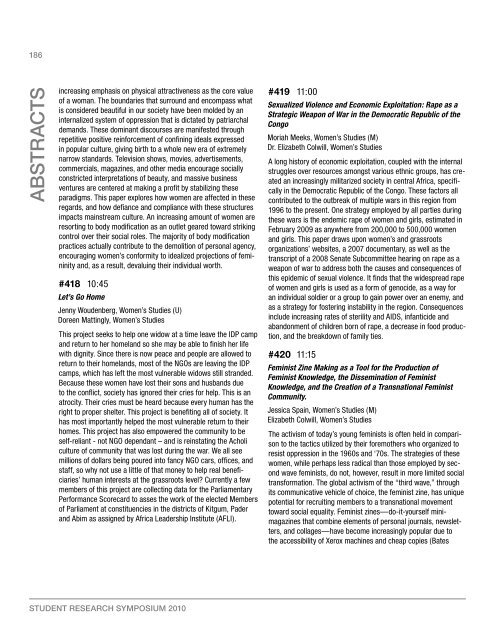STUDENT RESEaRch SympoSiUm 2010 - Graduate and Research ...
STUDENT RESEaRch SympoSiUm 2010 - Graduate and Research ...
STUDENT RESEaRch SympoSiUm 2010 - Graduate and Research ...
Create successful ePaper yourself
Turn your PDF publications into a flip-book with our unique Google optimized e-Paper software.
186<br />
AbstrActs<br />
increasing emphasis on physical attractiveness as the core value<br />
of a woman. The boundaries that surround <strong>and</strong> encompass what<br />
is considered beautiful in our society have been molded by an<br />
internalized system of oppression that is dictated by patriarchal<br />
dem<strong>and</strong>s. These dominant discourses are manifested through<br />
repetitive positive reinforcement of confining ideals expressed<br />
in popular culture, giving birth to a whole new era of extremely<br />
narrow st<strong>and</strong>ards. Television shows, movies, advertisements,<br />
commercials, magazines, <strong>and</strong> other media encourage socially<br />
constricted interpretations of beauty, <strong>and</strong> massive business<br />
ventures are centered at making a profit by stabilizing these<br />
paradigms. This paper explores how women are affected in these<br />
regards, <strong>and</strong> how defiance <strong>and</strong> compliance with these structures<br />
impacts mainstream culture. An increasing amount of women are<br />
resorting to body modification as an outlet geared toward striking<br />
control over their social roles. The majority of body modification<br />
practices actually contribute to the demolition of personal agency,<br />
encouraging women’s conformity to idealized projections of femininity<br />
<strong>and</strong>, as a result, devaluing their individual worth.<br />
#418 10:45<br />
Let’s Go Home<br />
Jenny Woudenberg, Women’s Studies (U)<br />
Doreen Mattingly, Women’s Studies<br />
This project seeks to help one widow at a time leave the IDP camp<br />
<strong>and</strong> return to her homel<strong>and</strong> so she may be able to finish her life<br />
with dignity. Since there is now peace <strong>and</strong> people are allowed to<br />
return to their homel<strong>and</strong>s, most of the NGOs are leaving the IDP<br />
camps, which has left the most vulnerable widows still str<strong>and</strong>ed.<br />
Because these women have lost their sons <strong>and</strong> husb<strong>and</strong>s due<br />
to the conflict, society has ignored their cries for help. This is an<br />
atrocity. Their cries must be heard because every human has the<br />
right to proper shelter. This project is benefiting all of society. It<br />
has most importantly helped the most vulnerable return to their<br />
homes. This project has also empowered the community to be<br />
self-reliant - not NGO dependant – <strong>and</strong> is reinstating the Acholi<br />
culture of community that was lost during the war. We all see<br />
millions of dollars being poured into fancy NGO cars, offices, <strong>and</strong><br />
staff, so why not use a little of that money to help real beneficiaries’<br />
human interests at the grassroots level? Currently a few<br />
members of this project are collecting data for the Parliamentary<br />
Performance Scorecard to asses the work of the elected Members<br />
of Parliament at constituencies in the districts of Kitgum, Pader<br />
<strong>and</strong> Abim as assigned by Africa Leadership Institute (AFLI).<br />
<strong>STUDENT</strong> RESEARCH SYMPOSIUM <strong>2010</strong><br />
#419 11:00<br />
Sexualized Violence <strong>and</strong> Economic Exploitation: Rape as a<br />
Strategic Weapon of War in the Democratic Republic of the<br />
Congo<br />
Moriah Meeks, Women’s Studies (M)<br />
Dr. Elizabeth Colwill, Women’s Studies<br />
A long history of economic exploitation, coupled with the internal<br />
struggles over resources amongst various ethnic groups, has created<br />
an increasingly militarized society in central Africa, specifically<br />
in the Democratic Republic of the Congo. These factors all<br />
contributed to the outbreak of multiple wars in this region from<br />
1996 to the present. One strategy employed by all parties during<br />
these wars is the endemic rape of women <strong>and</strong> girls, estimated in<br />
February 2009 as anywhere from 200,000 to 500,000 women<br />
<strong>and</strong> girls. This paper draws upon women’s <strong>and</strong> grassroots<br />
organizations’ websites, a 2007 documentary, as well as the<br />
transcript of a 2008 Senate Subcommittee hearing on rape as a<br />
weapon of war to address both the causes <strong>and</strong> consequences of<br />
this epidemic of sexual violence. It finds that the widespread rape<br />
of women <strong>and</strong> girls is used as a form of genocide, as a way for<br />
an individual soldier or a group to gain power over an enemy, <strong>and</strong><br />
as a strategy for fostering instability in the region. Consequences<br />
include increasing rates of sterility <strong>and</strong> AIDS, infanticide <strong>and</strong><br />
ab<strong>and</strong>onment of children born of rape, a decrease in food production,<br />
<strong>and</strong> the breakdown of family ties.<br />
#420 11:15<br />
Feminist Zine Making as a Tool for the Production of<br />
Feminist Knowledge, the Dissemination of Feminist<br />
Knowledge, <strong>and</strong> the Creation of a Transnational Feminist<br />
Community.<br />
Jessica Spain, Women’s Studies (M)<br />
Elizabeth Colwill, Women’s Studies<br />
The activism of today’s young feminists is often held in comparison<br />
to the tactics utilized by their foremothers who organized to<br />
resist oppression in the 1960s <strong>and</strong> ‘70s. The strategies of these<br />
women, while perhaps less radical than those employed by second<br />
wave feminists, do not, however, result in more limited social<br />
transformation. The global activism of the “third wave,” through<br />
its communicative vehicle of choice, the feminist zine, has unique<br />
potential for recruiting members to a transnational movement<br />
toward social equality. Feminist zines—do-it-yourself minimagazines<br />
that combine elements of personal journals, newsletters,<br />
<strong>and</strong> collages—have become increasingly popular due to<br />
the accessibility of Xerox machines <strong>and</strong> cheap copies (Bates


